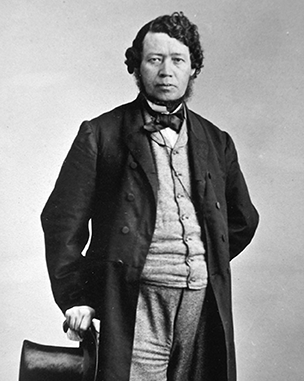Thomas D’Arcy McGee—Ireland’s lost patriot and Canada’s assassinated hero
Published in Issue 2 (March/April 2020), News, Volume 28On the occasion of the 250th anniversary of the Trinity College Historical Society (‘the Hist’).
By Ian Ashe

Above: Thomas D’Arcy McGee—the ‘greatest Irishman in Canadian history’, according to Conor Cruise O’Brien. (Alamy)
The Hist’s 250th anniversary in March 2020 is an apt occasion to mark the strong connection to Thomas D’Arcy McGee, who pleaded:
‘Am I remembered in Erin, I charge you, speak me true?
Has my name a sound, a meaning, in the scenes my boyhood knew?’
Edmund Burke, ancestral guardian of the Hist, believed that the ‘possible best’ solution in politics is probably the best solution. D’Arcy McGee wanted an independent Irish parliament in exchange for the ‘possible best’ peace, being retention of the Crown in Ireland, Scotland and England under a federal constitutional structure. Hist member Michael Doheny was an aggressive ally of the more extreme nationalist Trinity graduates John Mitchel and Devin Reilly. They sought a state of war between Ireland and Britain.
McGee attended a Wexford school and never attended university in Ireland. Fellow Young Irelanders Thomas Davis, John Blake Dillon, Thomas MacNevin (all former auditors of the Hist) and Michael Doheny had joined Daniel O’Connell’s Repeal Association in 1841. The Nation newspaper was then founded in 1842 by Gavan Duffy, Dillon and Davis. McGee worked for the pro-O’Connell Freeman’s Journal and The Nation, mentored by Gavan Duffy. The Irish Confederation, Young Ireland, the 1848 rebellion and Fenianism all emerged from this mix of primarily Hist/Trinity alumni. Interestingly, moderate Gavan Duffy eventually became premier of Victoria, Australia, and moderate D’Arcy McGee became a Canadian cabinet member and a principal father of Canadian confederation, which remains unimpaired to date by civil war.
McGee was shaken by the Famine, which he described movingly: ‘the towns have become one universal poorhouse and fever shed, the country one great graveyard’. What was McGee like? ‘I might have liked him better’, said Thomas Davis after his only meeting with him in 1845, ‘if he had not so obviously determined to transact an acquaintance with me.’ John Mitchel taunted McGee and Gavan Duffy as ‘rosewater revolutionists’.
McGee became secretary of the Irish Confederation and editor of The Nation. Devin Reilly was a work colleague. Michael Doheny wrote in The felon’s track that Reilly had no compunction about hitting below the belt at McGee. Jealousy was a feature. McGee never made it to the 1848 rebellion at Ballingarry, Co. Tipperary. Dublin reinforcements to his group had been blocked by the British. William Smith O’Brien led the Young Irelanders to chaotic defeat there. Hist participants were John Blake Dillon and Michael Doheny, while Trinity alumni Devin Reilly, John O’Mahony (later co-founder of the Fenians), Patrick O’Donoghue and John O’Leary were also active. John Mitchel was not there, having been previously convicted for sedition.
When McGee fled to the USA in 1848, he signed an opinion piece as ‘Thomas D’Arcy McGee, Traitor to the British Government’. Doheny slammed this as self-serving and it dangerously compromised Young Irelanders awaiting trial in Ireland. So the disputes of Ireland pursued McGee abroad and never ceased. John Mitchel escaped to New York in 1853. He set up the Irish Citizen, and reignited his derision of McGee and Gavan Duffy. In the USA, John Blake Dillon wrote to Gavan Duffy complaining that McGee had made a ‘scandalous’ attempt to present himself as ‘a sort of agent of yours in America’. McGee wrote of the ‘crisis of character’ within the Irish in America. This infuriated Doheny, who angrily pushed McGee down a flight of stairs.
McGee moved to Canada in 1857. He successfully pressured Prime Minister John A. MacDonald to complete a Canadian confederation of provinces, and his oratory on this was renowned in Canada. McGee in 1867 vilified Allen, Larkin and O’Brien (the ‘Manchester Martyrs’), executed for the killing of a policeman in a botched rescue of Fenian prisoners. John A. MacDonald warned McGee that his life was in danger. In 1868 McGee was shot dead in Ottawa by a Fenian sympathiser, the only Canadian federal politician to have been assassinated since Canada’s foundation.
Conor Cruise O’Brien, a former president of the Hist, judged him the ‘greatest Irishman in Canadian history’. It seems time to admit that Thomas D’Arcy McGee is worthy of being remembered in Erin. There is no doubt that he made mistakes, but his life reflects that he would be glad to congratulate the Hist on its 250th anniversary.
Ian Ashe, now retired and living in Ottawa, Canada, was auditor of the bicentenary session of the Hist in 1969–70.
















